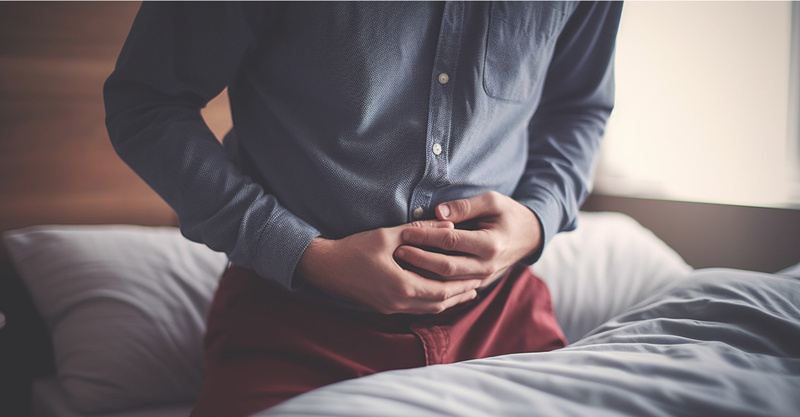Key Points
- Abdominal pain can be a symptom of various conditions, including gas, indigestion, appendicitis, food poisoning, kidney stones, and gallstones. Self-diagnosis and treatment with over-the-counter medications may not be sufficient and could potentially mask serious conditions that require medical attention.
- Gas or indigestion typically occurs after eating and can be a symptom of gastroesophageal reflux disease (GERD). If accompanied by symptoms such as nausea, bloating, belching, burning in the stomach, or intense abdominal pain, it's recommended to seek medical help.
- Appendicitis can occur at any age and if misdiagnosed, can lead to severe medical complications. Symptoms include aching pain around the belly button that shifts to the lower right abdomen, abdominal tenderness, sharp increasing pain, nausea, vomiting, low-grade fever, loss of appetite, diarrhea, constipation, and abdominal swelling.
- Food poisoning can occur from improperly cooked or stored food. If abdominal pain is accompanied by symptoms like diarrhea, nausea, vomiting, severe cramping, and fever, immediate medical care is advised.
- Kidney stones and gallstones can cause severe abdominal pain along with other symptoms. Kidney stone symptoms include pain that moves from the abdomen to the lower sides and back, groin pain, fluctuating pain, pain during urination, nausea, vomiting, cloudy urine, fever, and unusual urine color. Gallstones may cause pain in the upper abdomen and back, nausea, vomiting, low-grade fever, bloating, heartburn, indigestion, gas, and fatigue.
Pain in the abdomen or stomach cramps could be a sign of everything from appendicitis to gas to kidney stones. Many people diagnose abdominal pains on their own and then treat them with over the counter (OTC) medications when in fact, the pain could be something that requires medical attention at a walk-in clinic.
Gas or Indigestion
WedMD explains that gas and gallstones can cause pain in the abdomen and usually occurs after eating. It can also be a symptom of gastroesophageal reflux disease (GERD). The pain may increase when lying down. Mild gas and indigestion are easily treated with OTC antacid medications but if other symptoms are present, you may need to seek help at an urgent care. These include:
- Nausea or vomiting
- Bloated feeling not relieved by antacids
- Growling tummy
- Belching not cured by antacids or OTC gas medications
- Burning in the upper abdomen or stomach
- Intense abdominal pain
Appendicitis
Appendicitis can happen in people of all ages from the very young to the very old. If misdiagnosed at home, the appendix may burst causing severe medical problems like internal viruses that are hard to treat. In addition, the location of the abdominal pain may vary based on the age of the person. Seek immediate medical care if pain also includes:
- An aching type of pain that starts around your belly button and then shifts to your lower right abdomen
- Abdominal tenderness upon touching
- Sharp pain that increases over time
- Nausea or vomiting
- Low-grade fever
- Loss of appetite
- Diarrhea or abdominal swelling
- Constipation or inability to pass gas
- Swelling in the abdominal region
Food Poisoning
WedMD says there are over 250 types of food that can cause food poisoning if not cooked or stored properly and then eaten. Seek immediate care from a physician if you experience the following symptoms along with abdominal pain:
- Diarrhea not relieved by OTC medications or bloody diarrhea
- Nausea or vomiting
- Severe cramping
- Fever
Kidney Stones
Small kidney stones may pass on their own, but many do not and require urgent care and medical instructions such as increased water intake or other prescription medications. Along with abdominal pain, kidney stone symptoms include:
- Pain that moves from the abdomen to the lower sides and back
- Groin pain
- Pain that comes and goes and fluctuates in intensity
- Pain when urinating
- Nausea or vomiting
- Cloudy urine
- Fever or chills
- Red, pink or brown urine
Gallstones
Many people develop gallstones and have no symptoms. On the other hand, others may suffer from a variety of symptoms. When abdominal pain is severe, people should seek immediate care so a CAT scan or sonogram can be performed to assess the size of the stone. Some common symptoms include:
- Pain in the upper abdomen and back that continues for several hours
- Some patients will have pain under the ribs and above the abdomen
- Nausea or vomiting
- Low-grade fever
- Bloating, heartburn, indigestion or gas
- Weakness or tiredness
Abdominal pain that hasn't been doctor-diagnosed or isn't eased by OTC medications recommended by your physician may be a sign of a medical condition that requires urgent care. Instead of waiting to see if the symptoms subside, it's often best to seek out emergency care to ensure you aren't suffering from one of the above conditions.
Frequently asked questions
What could be the cause of abdominal pain or stomach cramps?
Abdominal pain or stomach cramps could be a sign of a variety of conditions, such as appendicitis, gas, indigestion, kidney stones, food poisoning, or gallstones.What are the symptoms of gas or indigestion?
Symptoms of gas or indigestion include a bloated feeling not relieved by antacids, a growling tummy, belching not cured by antacids or OTC gas medications, burning in the upper abdomen or stomach, and intense abdominal pain.What symptoms might suggest that abdominal pain is due to appendicitis?
Symptoms of appendicitis include an aching type of pain that starts around your belly button and then shifts to your lower right abdomen, abdominal tenderness upon touching, sharp pain that increases over time, nausea or vomiting, low-grade fever, loss of appetite, diarrhea or abdominal swelling, constipation or inability to pass gas, and swelling in the abdominal region.What are some signs that abdominal pain could be due to food poisoning?
Signs of food poisoning include diarrhea not relieved by OTC medications or bloody diarrhea, nausea or vomiting, severe cramping, and fever.What are the symptoms of kidney stones?
Symptoms of kidney stones include pain that moves from the abdomen to the lower sides and back, groin pain, pain that comes and goes and fluctuates in intensity, pain when urinating, nausea or vomiting, cloudy urine, fever or chills, and red, pink or brown urine.How might I know if my abdominal pain is caused by gallstones?
What should I do if my abdominal pain isn't eased by over the counter medications?
If your abdominal pain isn't eased by over the counter medications, it may be a sign of a medical condition that requires urgent care. It's often best to seek out emergency care to ensure you aren't suffering from a serious condition.Is it safe to self-diagnose abdominal pain?
It's not always safe to self-diagnose abdominal pain, as it could be a sign of a serious condition that requires medical attention. If your pain is severe or persistent, it's best to seek medical help.











